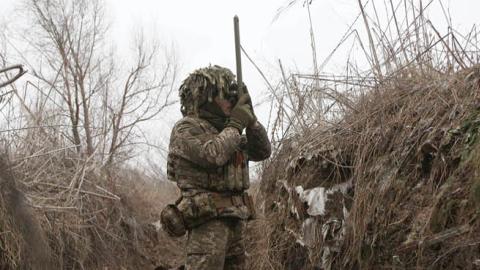Since revealing a major Russian military buildup on the borders of Ukraine, the Biden administration has launched a flurry of diplomatic initiatives, culminating in this week’s visit of the secretary of state, Antony Blinken, to Ukraine and Germany. On Friday, Blinken will meet with his Russian counterpart, Sergey Lavrov, for highly anticipated talks.
The object of Blinken’s mission is clear: to rally Europe, especially its largest power, Germany, into a common front while offering the Kremlin continued negotiations as an alternative to war.
Team Biden’s carefully orchestrated diplomacy gives the impression of a seasoned team at the controls. But just beyond the multilateral veneer lurks a fatal flaw in its approach: the belief, fashionable in progressive circles, that military deterrence is outdated. The implications for Ukraine, and the wider European security architecture, may prove calamitous. President Joe Biden’s first reaction to the military crisis over Ukraine was to publicly take US ground troops off the table — inexplicably communicating to Russian President Vladimir Putin the limits of our support.
Now, a “minor incursion,” as Biden mused at Wednesday’s press conference, could lead the West to “fight about what to do and not to do” in levying economic sanctions. This hardly strikes fear in the heart of the Kremlin.
Putin views himself in an advanced stage of warfare with the West. Not only has he cultivated European dependence on Russian fossil fuels, but he has built a wartime economy for the express purpose of withstanding the blow of sanctions. Is Europe, dependent on Russian natural gas, prepared to freeze in the midst of winter more than Putin is willing to suffer economic pain for the prize of Ukraine? The answer is unsettling.
If the stick of economic sanctions is hollow, the carrot of negotiations is unworkable. The Biden team has sought to defuse the crisis over Ukraine by offering to placate the Kremlin with the allure of arms control. In particular, it has repeatedly referenced two lapsed treaties: the Intermediate-Range Nuclear Forces Treaty (INF), which governed certain classes of missiles, and the Conventional Armed Forces in Europe Treaty (CFE), which constrained troop levels. This is pure wishful thinking.
Russia cheated on the INF for years before the Obama administration complained publicly about Russian transgressions and the Trump administration ended the treaty. Meanwhile, the odds of Vladimir Putin returning to an CFE-style agreement that caps his military forces in western and southern Russia — the twin seats of Russian power — are nil. Putin will only agree to terms that hamstring the West or allow for serial cheating: Neither is in the interest of the United States.
This prompts the question: Why sit down with the Russians at all? As Russia menaced Europe in another era, President Dwight Eisenhower undercut British Prime Minister Winston Churchill’s push for a summit with Moscow with the simple argument: Deeds matter more than rhetoric. Today, the United States is elevating Putin and negotiating at the barrel of a Kalashnikov over the future of the European security order. It should walk away and train its full attention on hardening Ukraine.
During his stop in Kiev this week, Blinken said all the right things. More important was what was left unsaid, however. Ukraine is in desperate need of large-scale defensive weapons before, not after, a full-scale Russian invasion takes place. To consider the provision of such weapons to Ukraine a provocation, as the Biden team evidently does, is especially shocking given President Biden’s prediction yesterday that Putin “will move in. He has to do something.”
Our British allies have shown the way. When Blinken touched down in Kiev, he disembarked in view of a cargo plane sent by the United Kingdom to deliver anti-tank systems. On its journey, the UK plane circumvented German airspace in an apparent attempt to avoid any friction with Berlin, which has ruled out sending lethal aid to Kiev.
America faces a choice: the watered-down consensus of multilateral economic sanctions or the rapid provision of large-scale defensive weapons to Ukraine. Ukraine is no geopolitical backwater. It presides over a long coastline in the Black Sea, which Putin covets to expand and connect the warm water ports he has already acquired in Crimea and Latakia, Syria.
To stop Putin, it’s time to embrace the tried and tested methods of military deterrence.
Read in NY Post

















